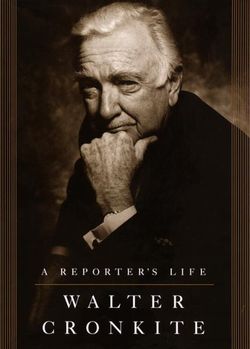But Walter Cronkite is also the man who loved to drive race cars "for the same reason that others do exhibitionist, dangerous stunts. It sets us apart from the average man; puts us, in our own minds, on a level just a little above the chap who doesn't race." He is also the man whose "softheartedness knows no rational bounds" and who always had "great problems at the theater, tearing up at the slightest offense against animals and people, notably the very old or the very young." He is the man who could barely refrain from spitting on the defendants at the Nuremberg Trials, and who could barely announce President Kennedy's assassination over the air for the sobs in his throat.
Walter Cronkite helped launch the juggernaut of television, and tried to imbue it with his own respect for quality and ethics; but now he occupies a ringside seat during the decline of his profession and the ascent of the lowest common denominator. As he aptly observes, "They'd rewrite Exodus to include a car chase."
Still, the American people know the difference. They know that for decades they have had the privilege of getting their news from a gentleman of the highest caliber. And they will immensely enjoy A Reporter's Life.



Share This Book: